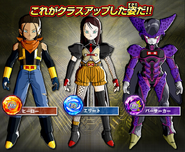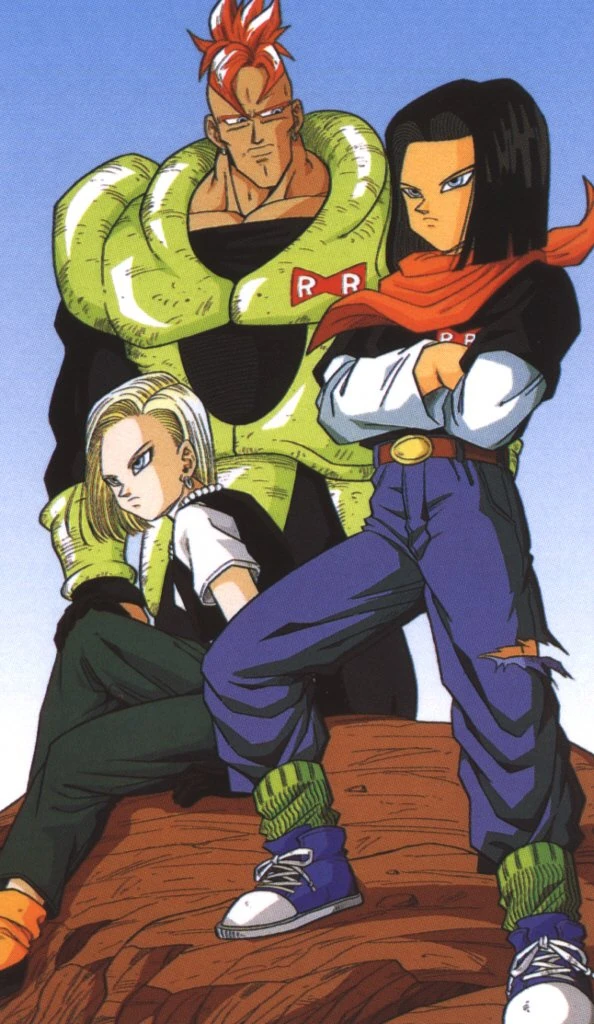
| |
| Android Jinzōningen Artificial Human Cyborg | |
|---|---|
| Homeworld | Earth |
| Average Height | Similar to the average Human |
| Diet | Normal androids: do not require food or water. Cyborgs: have the same diet as humans. |
| Sapience Level | Sapient |
Androids (人造人間, Jinzōningen; lit. "Artificial Humans") are robotic/cyborg Humans, most of which were created by the evil scientist Dr. Gero. Most of the androids are said to have unlimited energy and eternal life. Due to their inorganic nature, they, or at least the ones created by Dr. Gero, also have no aura (unlike Saiyans, Humans, and others), so they cannot be directly tracked using Scouters or Ki Sense. There are at least 6 units shown to have been fully functional throughout the original Dragon Ball manga.
Background
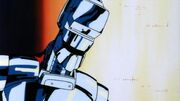
Dr. Kochin's Android form
Androids serve as main villains during the Android conflict, each serving a purpose of their own. Originally, all of the androids were plans used to kill Goku, however, most of the androids turn to the good side or are destroyed. However, in Future Trunks' Alternate Timeline, the androids succeed in their plans for world destruction, managing to kill all of the main Z Fighters (except for Goku, who dies of a heart virus, and Gohan, who survives but is killed 13 years later) until finally being destroyed by Trunks almost 20 years later.
There are three types of androids seen in the series, according to their power supplies:
- The kind with no drawbacks and an unlimited power supply (such as #8, #16, #17 and #18). This type was said to be more difficult to control. They are immune to being directly detected via Ki Sense or Scouters due to lacking a ki-signature. However, they can be detected indirectly via their opponents' ki.
- The kind which requires constant intake of energy, usually stolen from victims, to keep their power reservoir from draining, which would cause the android to malfunction (such as #19 and #20).[1] The more energy they absorb from their victims, the stronger they get. Curiously, Dr. Gero oversees his configuration into the latter, rather than the type with no apparent limitations (though it is implied by #18 that this is because the energy-absorbing model is easier to control). This model, like the other Android models (exempting Bio-Androids), is immune to being directly detected by Ki Sense or Scouters due to lacking a ki-signature. However, they can be detected indirectly due to the depleting ki-signature of the victim.
- The kind whose energy exists and circulates as a form of organic ki similar to that of naturally born beings, otherwise known as Bio-Androids (such as Cell and the Cell Juniors). These androids can be tracked by Ki Sense, though as Cell proves, they in turn can also learn to sense other's ki as well as mask their own ki signature to elude pursuit, just as organics can. In the case of Cell and all bio-androids based on him, their organic ki is derived from the cells of powerful humans, Saiyans, Namekians, and members of Frieza's race.
There are also three types of androids seen in the series, according to their "base" or materials:
- "Cyborgs", androids made from an original human as a base (such as #17, #18, #20, and possibly #13). Since they are human-based, they can become stronger if they train. Though they do not need to eat, they do need to hydrate. Also, their cells deteriorate slowly, so they age slowly too.[2]
- "Total artificial construct types", androids which were made up completely from mechanical parts (such as #8, #14, #15, #16, #19, and Arale). For some reason, the totally artificial ones have a blood-like liquid crimson substance, presumably a kind of power oil.
- "Bio-Androids", androids constructed either through biological engineering or as clones spawned from other bio-androids rather than from machine parts and/or a human base (Cell and the Cell Juniors).
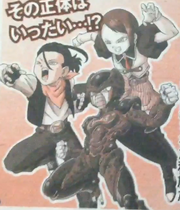
Android avatars from Dragon Ball Heroes
As the most developed bio-android with the most versatile energy source, Cell also possess elements of the first two android power supply types as well. For one, he is able to absorb the energy of others and integrate them into his being through his tail, either by sucking them up or swallowing them whole. The latter method actually transforms him into a stronger state, and if he absorbs both #17 and #18 this way, he evolves into a highly potent form he describes as "perfection". Also, his cells can store memory of any form of power they ever taste, allowing him to return to that form if he should ever nearly become vaporized after losing it. Thanks to this and combined with the Zenkai healing factor of his Saiyan cell properties, he can in fact return from near death even stronger than ever before no matter how severely he should be weakened beforehand.
Red Ribbon Army series
Main article: Red Ribbon Androids
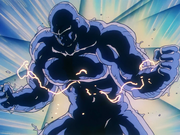
Unnamed blue android seen during Future Trunks' story
- Major Metallitron – Created by the Red Ribbon Army, destroyed by Goku and again by Pan, and may have not been made by Dr. Gero.
- Dr. Gero's Prototype Androids – Early test models.
- Unnamed Blue Android – Only seen in a story told by Future Trunks.
- Android 1 – Considered a failure and destroyed.
- Android 2 – Considered a failure and destroyed.
- Android 3 – Considered a failure and destroyed.
- Android 4 – Considered a failure and destroyed.
- Android 5 – Considered a failure and destroyed.
- Android 6 – Considered a failure and destroyed.
- Android 7 – Considered a failure and destroyed.
- Android 8 – Created by Dr. Gero and Dr. Flappe, now living at Jingle Village.
- Android 9 – In Dragon Ball Online, Android 9 is Commander Red revived as a Cyborg. In Dragon Ball SD, Android 9 is an Android version of Akio Iyoku labeled as "Iyo-ku-gō" (a play on the name of the V-Jump Editor-in-Chief's name).
- Android 10 – Considered a failure and destroyed.
- Android 11 – Considered a failure and destroyed.
- Android 12 – Considered a failure and destroyed.
- Android 13 – Completed by Dr. Gero's Super Computer. Does not appear in manga, although the Androids ABCs section implies that they were nearing completion.
- Super Android 13 – Fused with Android 14 and Android 15, destroyed by Goku in Super Android 13!
- Android 14 – Completed by Dr. Gero's Super Computer. Does not appear in manga, although the Androids ABCs section implies that they were nearing completion; destroyed by Future Trunks in Super Android 13!
- Android 15 – Completed by Dr. Gero's Super Computer. Does not appear in manga, although the Androids ABCs section implies that they were nearing completion; destroyed by Vegeta in Super Android 13!
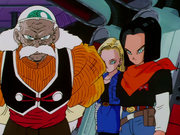
Androids 20, 18 and 17
- Android 16 – Pure robotic, with uncompleted programming. Destroyed by Perfect Cell during the Cell Games. Later revived, living in peace in the forest with animals.[3]
- Android 16A – Copy of #16 created by the Red Pants Army.
- Android 16B – Copy of #16 created by the Red Pants Army.
- Android 16C – Copy of #16 created by the Red Pants Army.
- Android 17 – Half-human and half-android (correct term cyborg), considered a failure, fused with Hell Fighter 17, resurrected, living in peace by himself.
- Future Android 17 – Half-human and half-android (correct term cyborg), considered a failure, reigned terror on Earth for nearly 20 years, eventually destroyed by Future Trunks.
- Hell Fighter 17 – Machine mutant, fused with Android 17.
- Super 17 – Fusion of Android and Hell Fighter 17, half-cyborg and half-machine mutant, destroyed by Goku and Android 18.
- Android 18 – Half-human and half-android (correct term cyborg), considered a failure, living in peace with Krillin.
- Future Android 18 – Half-human and half-android (correct term cyborg), considered a failure, reigned terror on Earth for nearly 20 years, eventually destroyed by Future Trunks.
- Android 19 – Pure robotic, considered a success, destroyed by Vegeta.
- Android 20 – Robotic body of Dr. Gero, destroyed by Android 17 and again by Super 17.
- Future Android 20 (replica) – Robotic copy of Future Gero used as a body by his Super Computer in the Nintendo DS game Dragon Ball Z: Supersonic Warriors 2.
- Androids 20 – Two other copies of Future 20 created by the Future Gero's Super Computer in order to assist it in combat in Supersonic Warriors 2.
- Nimu – A male Android who is the Android "Hero" avatar in Dragon Ball Heroes, and who was named in Dragon Ball Heroes: Victory Mission.
- Nico – A female Android who is the Android "Elite" avatar in Dragon Ball Heroes, and who was named in Dragon Ball Heroes: Victory Mission.
Bio-Androids
Main article: Bio-Android
- Sandmen – Bio-Androids in Dragon Ball Z: Attack of the Saiyans.
- Yorgans – Bio-Androids in Attack of the Saiyans.
- Failed Experiments – Bio-Androids in Attack of the Saiyans.
- Cell – Bio-mechanical, killed by Gohan.
- Present Cell – Main timeline version of Cell, destroyed by Krillin and Future Trunks.
- Future Cell – Alternate timeline version of Cell, killed by Future Trunks.
- Cell Jrs. – Bio-Androids who are the offspring of Cell, destroyed by Gohan.
- Super 17 w/ Cell absorbed – The form Super 17 takes after absorbing the Bio-Android Cell. The form appears in Dragon Ball Heroes only.
- Genome – A Bio-Android who is the Android "Berserker" avatar in Dragon Ball Heroes, and who was named in Dragon Ball Heroes: Victory Mission.
- Cell-X – Time Breaker clone of Cell in Dragon Ball Online.
- Bio-Androids – Bio-mechanical species of Cell-like creatures in Dragon Ball Online. They are Larval Cells, Imperfect Cells, and Cell-X Jrs.
Other Androids
- Arale Norimaki – Created by Senbei Norimaki in Dr. Slump.
- Obotchaman – Created by Dr. Mashirito in Dr. Slump and is based on the same design plans that made Arale.
- Cyborg Tao – Mercenary was rebuilt as a cyborg after being defeated by Goku. He describes himself as "the world's first cyborg assassin."
- Dr. Kochin – Movie character, accidentally destroyed by Dr. Wheelo (knocked him into a chasm where he exploded).
- Dr. Wheelo – Movie character, killed by Goku in Dragon Ball Z: The World's Strongest.
- Cacao – Movie character only, half android-half Ikonda-seijin (a cyborg). Killed by Goku in Dragon Ball Z: The Tree of Might.
- Mecha Frieza – Frieza was rebuilt thanks to his father soon after the latter found him injured following his deadly battle against Super Saiyan Goku, becoming half organic, half mechanical (like Mercenary Tao).
- Meta-Coolers – Movie characters, destroyed by Goku and Vegeta in Dragon Ball Z: The Return of Cooler.
- Future Meta-Coolers – Antagonists in Dragon Ball Z: Shin Budokai - Another Road. Destroyed by the present and future Z Fighters.
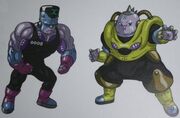
Android enemies designed for Dragon Ball Online
- Metal Cooler (nucleus) – Cooler revived as the core of the Big Gete Star.
- Hatchiyack – A machine that was created by the Tuffle scientist Dr. Raichi.
- Android 8000 – An android in the computer game Dragon Ball Online, based off Android 8. It has a variant named Android 8000 MX.
- Android 19000 – An android in Dragon Ball Online, based off Android 19.
- Octopapa – Turned into a cyborg by the Time Breakers and put in charge of some cave, near the location of Cell-X, in Dragon Ball Online.
Bio-Warriors
Main article: Bio-Warrior
- Bio-Men – Bio-Warriors created by Dr. Kochin.
- Kishime – A Bio-Warrior created by Dr. Kochin.
- Misokatsun – A Bio-Warrior created by Dr. Kochin.
- Ebifurya – A Bio-Warrior created by Dr. Kochin.
- Bio-Broly – Bio-Warrior clone of Broly created by Dr. Collie.
- Bio-Warriors – Biological warriors created by human scientists.
Trivia
- Before the android concept had become more fleshed out in the anime series, particularly by the Trunks Saga (when previously there were only a few android characters in the franchise), the term 'android' is used in "Enter Goku" by Vegeta, to describe the seemingly invincible Recoome. Funnily enough, Android 16 looks very similar to Recoome in terms of hair and stature.
- In the manga, the first character to use the term "android" is Android 8 in the chaper "Muscle Tower's Final Hour."
- Although #17, #18, and #20 (Dr. Gero) are called androids, they actually are cyborgs (the androids are called cyborgs in some dubs). Cell is a bio-mechanical creation.
- Despite being mechanical, thus having no soul or inner essence, even the full androids still manage to make it to other world after their destruction (as Kochin's Bio-men are seen in Fusion Reborn, and Android 19 is seen in Dragon Ball GT).
- Some Dragon Ball Z video games that use aura to show ones level of ki (such as Dragon Ball Z: Budokai 3), do not show aura for Androids. In the Budokai Tenkaichi series, Androids can not charge their ki up, a possible reference to their unlimited energy.
Gallery
References
- ↑ Dragon Ball Z episode 128,"Double Trouble for Goku"
- ↑ "Dragon Ball Q&A" section, Dragon Ball Full Color Androids Saga volume 6, 2014
- ↑ Dragon Ball Z 2: Super Battle, 1995




